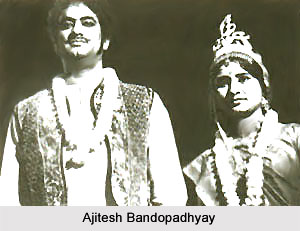 Ajitesh Bandopadhyay was a Bengali actor who also ventured into direction in the later part of his life. He grew interest and involved in theatre during the late 1950s when he was active member of the Communist Party of India and, through it, the Indian People`s Theatre Association (IPTA). His achievement was such that within six or seven years, by the mid-1960s, he was often mentioned in the same breath as the two leading lights of Bengali theatre, Sombhu Mitra and Utpal Dutt, then at the height of their popularity and renown.
Ajitesh Bandopadhyay was a Bengali actor who also ventured into direction in the later part of his life. He grew interest and involved in theatre during the late 1950s when he was active member of the Communist Party of India and, through it, the Indian People`s Theatre Association (IPTA). His achievement was such that within six or seven years, by the mid-1960s, he was often mentioned in the same breath as the two leading lights of Bengali theatre, Sombhu Mitra and Utpal Dutt, then at the height of their popularity and renown.
Early Life of Ajitesh Bandopadhyay
Ajitesh was born in the year 1933 on 30th September in Ropagram, Asansol. He did his schooling from Kulti High School. He completed his bachelor of arts in English from Manindra College, though at first he joined Asansol College, in 1957. For few days he took up teaching as profession.
Life in Theatre for Ajitesh Bandopadhyay
Ajitesh Bandopadhyay formed his group Nandikar in 1960 and severed links with IPTA in 1962. Significantly, it debuted with an adaptation of Ibsen`s Ghosts, an indication of the way he led Nandikar to develop. It cannot be said that it did not produce original plays. On the contrary it did so many including a few by Bandopadhyay himself. But more than any other group that gave leadership to Bengali theatre, Nandikar in its long and distinguished existence adapted more foreign texts and diluted their foreignness by transforming them into convincing Bengali drama. Most of them proved popular with the public and critics. They extended the horizon of Bengali viewers` experience about theatrical ideas. Among the sometimes-bewildering array of dramatists that Nandikar presented, Bandopadhyay himself regularly adapted Chekhov and Brecht. Ajitesh Bandopadhyay directed nearly all the early productions. Most of them were praiseworthy. A few of them were truly memorable. Natyakarer sandhane chhati charitra i.e. `Pirandello`s Six Characters in Search of an Author` in 1961, Manjari amer manjari i.e. `Mango Blossoms`, from Chekhov`s Cherry Orchard in 1964, Sher Afghan or Pirandellos Henry IV in 1966, Tin paysar pala or `Three-paisa Pala`, Brecht`s Threepenny Opera in 1969, Bhalo manush i.e. Brecht`s Good Person of Setzuan in 1974. Although they featured star performers like Keya Chakrabarti and Rudraprasad Sengupta, but it can always be said that behind Nandikar`s success there primarily lay Bandopadhyay`s personality and talent. Tall, well-built, with a supple and statuesque body, he was additionally endowed with a bass voice of a range and resonance rare among the best actors of his time. He used these assets assiduously to add to his outstanding histrionic skills. The result was a towering stage presence that few of his contemporaries could match.
Ajitesh Bandopadhyay was an imaginative director. He knew how to turn a play into a crowd-puller. If in so doing he was criticized, with some justification, for deviating from the original spirit and character, he did not seem to care. The compulsive drive for larger audiences and professionalism explains why Nandikar ventured in 1974 to hire Rangana, a playhouse in the heartland of Kolkata`s commercial stage. He spectacularly mounted the Brecht plays there and a few others. They drew crowds but the group had to depart after three years. Bandopadhyay left Nandikar in 1977 and formed Nandimukh, which produced Pap Punya i.e. `Vice and Virtue in` in 1978 and his adaptation of Tolstoy`s Power of Darkness. In it he gave an unforgettable demonstration of the depth and range of his acting.
Award Received by Ajitesh Bandopadhyay
In 1976, he got Sangeet Natyak Academy award for his directorial ventures in theatre.
Later Life of Ajitesh Bandopadhyay
His participation in Jatra, professional theatre, and cinema during the last five years of his life was due to his need for popular communication. He directed the film Tin bhubaner pare i.e. "Beside Three Worlds" in 1969.
Ajitesh Bandopadhyay died in the year 1983.




















